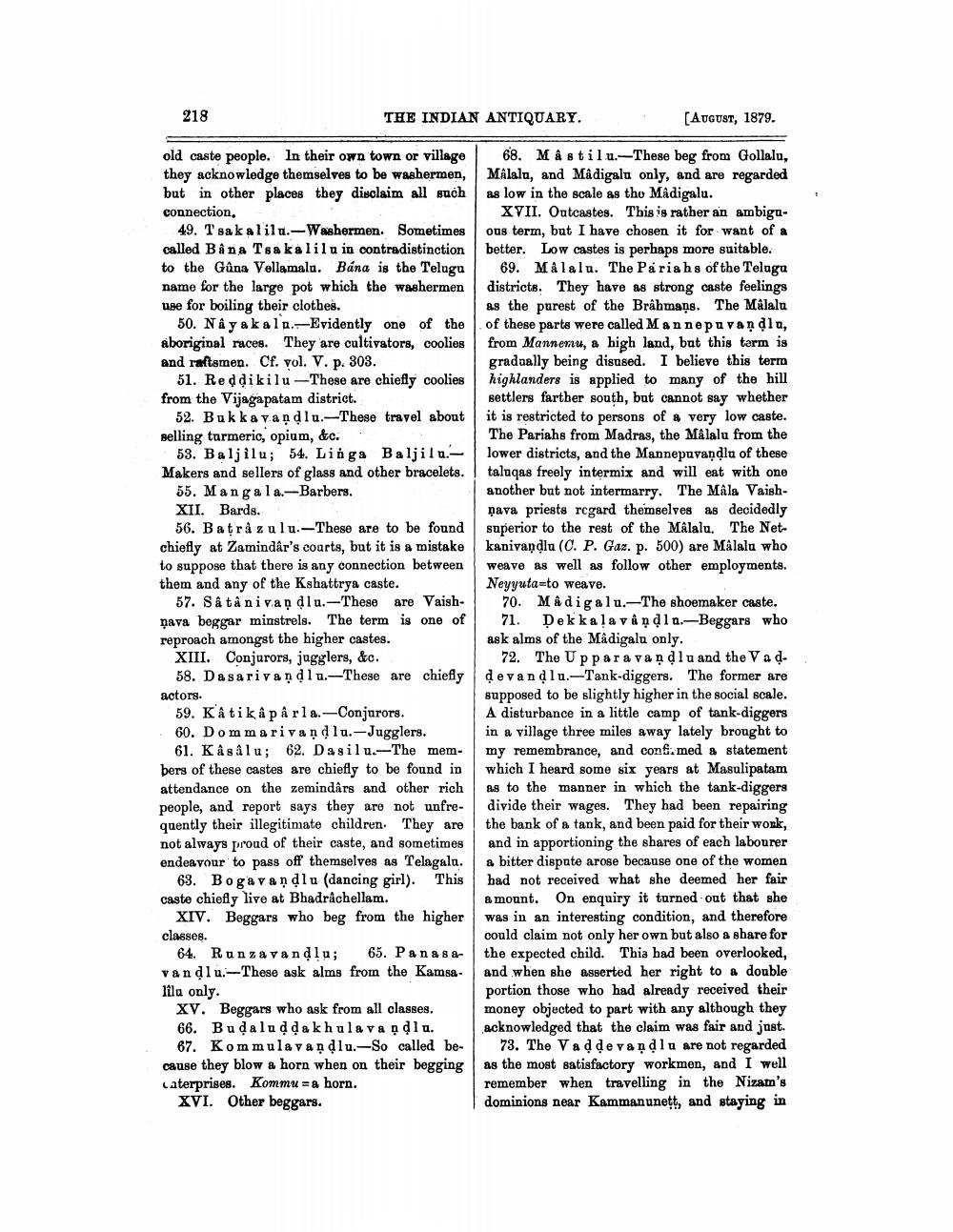________________
218
THE INDIAN ANTIQUARY.
old caste people. In their own town or village they acknowledge themselves to be washermen, but in other places they disclaim all such connection.
49. Tsakalilu.-Washermen. Sometimes called Bâna Tsakalilu in contradistinction to the Gûna Vellamalu. Bána is the Telugu name for the large pot which the washermen use for boiling their clothes.
50. Nayakala. Evidently one of the aboriginal races. They are cultivators, coolies and raftsmen. Cf. vol. V. p. 303.
51. Redḍikilu -These are chiefly coolies from the Vijagapatam district.
52. Bukkavandlu.-These travel about selling turmeric, opium, &c.
53. Baljilu; 54. Linga Baljila.Makers and sellers of glass and other bracelets. 55. Mangala-Barbers. XII.
Bards.
56. Batra zulu.-These are to be found chiefly at Zamindar's courts, but it is a mistake to suppose that there is any connection between them and any of the Kshattrya caste.
[AUGUST, 1879.
68. Mâstilu.-These beg from Gollalu, Malalu, and Mâdigalu only, and are regarded as low in the scale as the Mâdigalu.
XVII. Outcastes. This is rather an ambiguous term, but I have chosen it for want of a better. Low castes is perhaps more suitable.
69. Malalu. The Pariahs of the Telugu districts. They have as strong caste feelings as the purest of the Brahmans. The Mâlalu of these parts were called Man nepuvaṇḍlu, from Mannemu, a high land, but this term is gradually being disused. I believe this term highlanders is applied to many of the hill settlers farther south, but cannot say whether it is restricted to persons of a very low caste. The Pariahs from Madras, the Mâlalu from the lower districts, and the Mannepuvandlu of these taluqas freely intermix and will eat with one another but not intermarry. The Måla Vaishpava priests regard themselves as decidedly superior to the rest of the Mâlalu. The Netkanivaṇḍlu (C. P. Gaz. p. 500) are Mâlalu who weave as well as follow other employments. Neyyuta to weave.
70. Madigalu.-The shoemaker caste. 71. Dekkalavânḍla.-Beggars who ask alms of the Mâdigalu only.
72. The Uppara vandlu and the V a d
57. Sâtanivan dlu.-These are Vaishnava beggar minstrels. The term is one of reproach amongst the higher castes.
XIII. Conjurors, jugglers, &c.
58. Dasarivandlu.-These are chiefly devandlu.-Tank-diggers. The former are
actors.
59. Katikåpårla.-Conjurors.
60. Dommarivandlu.-Jugglers.
61. Kâsâlu; 62. Dasilu.-The members of these castes are chiefly to be found in attendance on the zemindârs and other rich people, and report says they are not unfrequently their illegitimate children. They are not always proud of their caste, and sometimes endeavour to pass off themselves as Telagala. 63. Bogavanḍlu (dancing girl). This caste chiefly live at Bhadrâchellam.
supposed to be slightly higher in the social scale. A disturbance in a little camp of tank-diggers in a village three miles away lately brought to my remembrance, and confirmed a statement which I heard some six years at Masulipatam as to the manner in which the tank-diggers divide their wages. They had been repairing the bank of a tank, and been paid for their work, and in apportioning the shares of each labourer a bitter dispute arose because one of the women had not received what she deemed her fair amount. On enquiry it turned out that she
XIV. Beggars who beg from the higher was in an interesting condition, and therefore classes.
64. Runzavanḍlu; 65. Panasavandlu.-These ask alms from the Kamsalilu only.
could claim not only her own but also a share for the expected child. This had been overlooked, and when she asserted her right to a double portion those who had already received their money objected to part with any although they acknowledged that the claim was fair and just.
XV. Beggars who ask from all classes. 66. Buḍaluḍḍakhulava ṇḍlu. 67. Kommulavandlu.-So called because they blow a horn when on their begging Caterprises. Kommu=a horn.
73. The Vadde vandlu are not regarded as the most satisfactory workmen, and I well remember when travelling in the Nizam's dominions near Kammanunett, and staying in
XVI. Other beggars.




